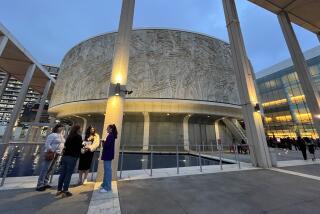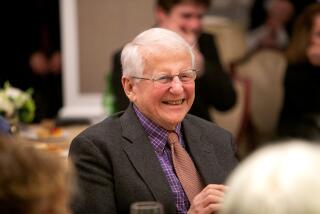After revolutionizing West Coast theater, Bill Rauch takes his inclusive vision to New York
As theatergoers surge out the doors of the Oregon Shakespeare Festival’s three theaters, the air hums with discussions about the just-seen shows. Next morning, conversations are still going strong at restaurants and hotel breakfast rooms throughout Ashland, a vibrant university city in southwest Oregon.
Theater is, quite demonstrably, the talk of this town — and these days, the conversation is increasingly national.
In the 11 years that Bill Rauch has been artistic director, Oregon Shakespeare has evolved into a major commissioner and developer of plays and musicals. Three shows commissioned by the company have advanced to Broadway in the last 4½ years. “All the Way” won the best play Tony Award in 2014 and was made into an Emmy-nominated TV movie. “Sweat” was awarded the 2017 Pulitzer Prize for drama and was nominated alongside “Indecent” for the best play Tony in 2017.
This fall and next spring, Los Angeles will be in the pipeline too. “Sweat” is the Mark Taper Forum’s current production, and “Indecent” will be at the adjacent Ahmanson Theatre in June.
These plays embody a core Rauch principle: inclusion.
“Work is richer when it reflects the diversity of the country — the country that we’ve been, the country that we are now and especially the country that we’re becoming,” Rauch says in his office overlooking Oregon Shakespeare’s theaters in downtown Ashland.
Lynn Nottage’s “Sweat” is about working-class Pennsylvanians — African American and white workers bonded through years spent shoulder-to-shoulder at a manufacturing plant — who turn territorial as jobs disappear in the early 2000s. Paula Vogel’s “Indecent” revisits a New York incident in 1923, when a theater troupe was arrested on obscenity charges for performing a play about two women who fall in love. And Robert Schenkkan’s “All the Way” eavesdrops on President Lyndon B. Johnson and the Rev. Martin Luther King Jr. in 1963 and 1964 as they maneuver the Civil Rights Act to congressional passage.
Now the Rauch years in Oregon are coming to an end.
We’re telling the best stories that we can possibly tell — the most dynamic, the best writing — period.
— Bill Rauch
He will be in Ashland through next July to open the 2019 season’s final show. Then he’ll move his family to New York to become the first artistic director of the Ronald O. Perelman Center for the Performing Arts, which is being constructed beside the 9/11 Memorial at the World Trade Center complex.
A typical Rauch-constructed season in Oregon has been a mix of namesake Shakespeare, other classics, a musical or two, at least one company commission and other recent plays — all multi-ethnically cast, another of Rauch’s commitments. This season, he says, actors of color make up 70% of the roster.
And diversity blossoms in other ways.
The buzz this season has largely centered on a staging of the musical “Oklahoma!” with same-sex couples and gender-nonconforming characters of varied ethnicities woven into a 1906 rural community’s fabric.
“We’re telling the best stories that we can possibly tell — the most dynamic, the best writing — period,” Rauch says. “The fact is: Voices that have been too often marginalized in our theater have some of the most exciting stories to tell. So if we’re going to tell the best stories, we darn well better have a mix of storytellers and stories that reflect gender diversity and many, many other expressions of identity.”
Michael Ritchie, artistic director of Center Theatre Group, which runs the Taper and Ahmanson, says, “When I think of Bill, I think of empathy, in capital letters.”
Rauch, 56, used to be one of L.A.’s own. Before leaving for Oregon in 2007, he led the Cornerstone Theater Company, which has made its home here since 1992. He co-founded the company in his 20s with a mission to embed itself in communities and engage residents in making theater for — and about — themselves.
“Cornerstone completely shaped the human being and the artist that I am,” he says. “Cornerstone was founded out of a great love of the individual human story and the power of community — and social context being a powerful and often under-looked force in shaping our national identity.”
When asked to share more about himself, Rauch turns his head for a moment, saying, “I feel self-conscious.”
Then he offers: “The fact I’m a gay man, the fact that I’ve got mixed-race kids, a brother who’s disabled — there are certainly biographical facts that I know have helped shape who I am. And also the fact that my dad was a marketing executive who got transferred constantly; we moved nine times in my first 19 years, so clearly there’s something in that in terms of Cornerstone’s impulse to work with multiple communities.”
Rauch guest-directed shows at Oregon Shakespeare for five seasons before he was offered the top artistic post. Founded in 1935 as a three-day festival, it has grown to an eight-month season of 11 shows. As each play opens, it joins a rotating repertory of shows cycling through performance slots in three theaters: an outdoor, Elizabethan-style stage with 1,200 seats; a traditional theater with 600 seats and a flexible space accommodating 270 to 358 people. That adds up to more than 800 performances a year, attended by about 390,000 people. Roughly 575 theater professionals are employed in making it all happen.
85% of audience members are tourists, many returning year after year.
Much of this was happening before Rauch’s arrival, but under his leadership, the yearly operating budget has grown from $24.5 million when he started to this year’s $40.5 million. While expanding its development of plays and, now, musicals, the company also vastly upgraded and increased its production facilities.
“Sweat,” “Indecent” and “All the Way” were born of OSF’s most visible play-creation program, known as American Revolutions. Through it, the company is commissioning 37 works inspired by moments of revolutionary change in U.S. history. The program is run by Cornerstone co-founder Alison Carey and substantially underwritten by the Andrew W. Mellon Foundation.
Good theater both connects you to your own humanity and to the humanity of people who are unlike you.
— Bill Rauch
“The American Revolution cycle,” says “Sweat” playwright Nottage, “was an invitation to think big, both in terms of the weight of the ideas and the size of the production. This was at a time when other theaters throughout the country were rewarding playwrights for shrinking their cast and simplifying their work for a mainstream audience. OSF, Bill Rauch and Alison Carey encouraged me to be adventurous and expansive in my reach.”
It’ll be hard for Rauch and his husband, actor-director Christopher Liam Moore, to say goodbye next year. “Our kids were 2 and 7 when we moved here,” he says. “They’ll be 14 and 19 when we move next year; they literally grew up in Ashland.”
Rauch wasn’t looking to leave OSF but was captivated by “the once-in-a-lifetime opportunity” at the Perelman.
A performing arts center has long been part of the plans for rebuilding at the World Trade Center site. It got the go-ahead in 2016 with a $75-million gift from billionaire investor Ronald O. Perelman. Performances in its three theaters will be multidisciplinary: music, dance, chamber opera and film, as well as a theater.
Rauch intends to take the idea of world trade in a new direction, thinking about it in terms of “whose voices, as artists, are valued” — and what that can mean “on that sacred ground of the World Trade Center.”
The Perelman, scheduled to open during the 2020-21 performance season, is envisioned to be at once international and local. As an example of programming, Rauch suggests that one performance space could host a music group from China that specializes in blending traditional and contemporary instruments while another houses a new play by a Chinese American playwright and the third, a community-made dance piece by Chinese immigrant youths from New York’s five boroughs — all speaking to the experience of being Chinese or Chinese American.
As he looks at American theater today, Rauch is encouraged to see companies becoming more inclusive. “The dialogue has shifted in a healthy way, in terms of whose voices are represented — more diverse voices, more communities, more gender parity,” he says. “It’s way too little too late but moving in the right direction.”
And audiences are responding.
In the closing minutes of “Oklahoma!” — which Rauch directed — cowhands and ranchers gather for the wedding of lesbian couple Curly and Laurey, enfolding them within the community. Afterward, the cheering audience at a recent performance was so caught up in communal spirit that hardly anyone in the 600-seat theater headed for the exits. People remained in place, clapping in time to the band, until the play-out music ended.
“Good theater surprises you,” Rauch says. “It both affirms deeply held beliefs and it challenges them in ways that you are not expecting. And good theater both connects you to your own humanity and to the humanity of people who are unlike you. Good theater reveals our interdependence as human beings.”
♦ ♦ ♦ ♦ ♦ ♦ ♦ ♦ ♦ ♦
Where might you have seen a show that emerged from Oregon Shakespeare Festival?
Shows commissioned by OSF
“All the Way,” South Coast Repertory, 2016; HBO, 2016; Broadway, 2014
“Sweat,” Mark Taper Forum, ongoing; Broadway, 2017
“Indecent,” Ahmanson Theatre, June 2019; La Jolla Playhouse, 2015; Broadway, 2017
Productions originating at OSF
“Into the Woods,” the Wallis, 2014
“Guys and Dolls,” the Wallis, 2015
Shows given their world premiere at OSF
“Equivocation,” Geffen Playhouse, 2009
“Head Over Heels,” Broadway, ongoing
Twitter: @darylhmiller
ALSO
What Happens When Factory Jobs Disappear? Playwright Lynn Nottage investigates in ‘Sweat’
The Election’s on Everyone’s Mind as SCR presents ‘All the Way’
For Mary Zimmerman, Overseeing ‘Guys and Dolls’ at the Wallis, It Starts With Imagination
Review: ‘Pretty Woman’ and ‘Head Over Heels’ Try Oh-So-Hard to Revive Beauty and Beat for Broadway
Review: ‘Indecent’ Is a Moving Reminder of Art’s Power to Expose Truths
Review: Who Are These Trump Voters? For a Thoughtful Portrait, Turn to Lynn Nottage’s ‘Sweat’
More to Read
The biggest entertainment stories
Get our big stories about Hollywood, film, television, music, arts, culture and more right in your inbox as soon as they publish.
You may occasionally receive promotional content from the Los Angeles Times.







